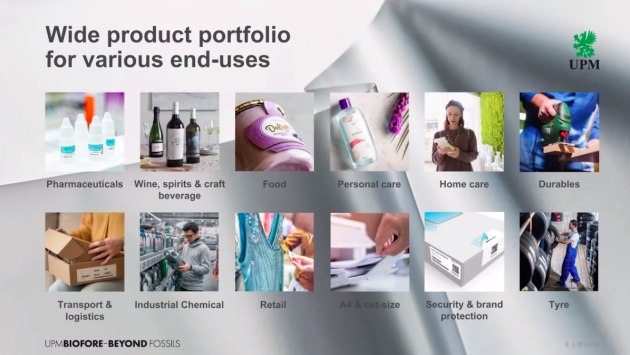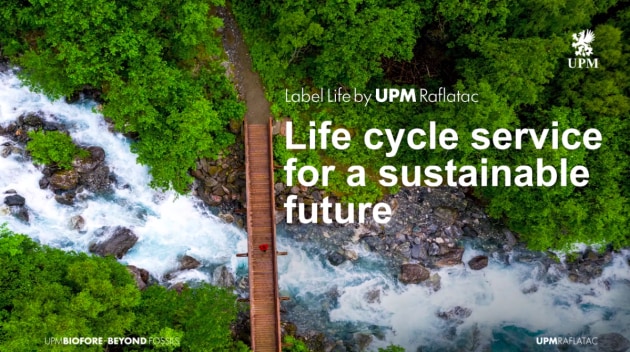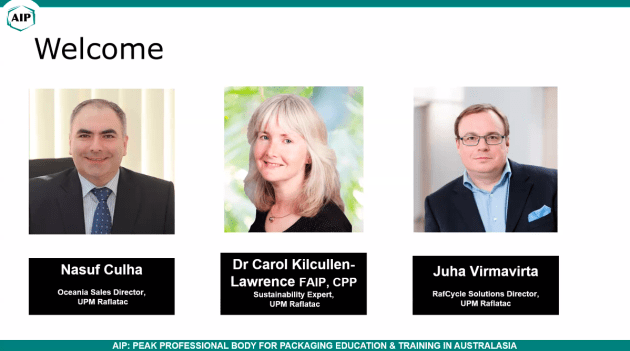The UPM Raflatac team led Australian Institute of Packaging (AIP) members on a virtual tour of their facility this week, and delivered an in-depth presentation to explain why sustainable labels matter.
UPM Raflatac creates high-performing labelling materials for branding and promotion, informational labels, and labels with functionality.
Using their expertise, they work with brands and businesses by providing labelling solutions that support creative product packaging design, meet business goals, and reach towards sustainability targets.
Today, UPM Raflatac manufactures a vast array of label stocks, and gives a unique insight into the importance of matching the right label with the packaging, particularly as they strive to help brands to reach towards sustainability targets, such as the 2025 APCO National Packaging Targets.
“Globally, we have a wide range of our products, and our product portfolio caters for a wide variety of end users, such as pharmaceuticals, wine and spirits, and food and retail sectors, to name a few,” said Nasuf Culha, Oceania sales director, UPM Raflatac.
“We have been in business for over 40 years, and we do consider ourselves to be the leader in sustainable labelling across the self-adhesive label industry worldwide.”

Speaking on the approach to sustainability that the company takes, Dr Carol Kilcullen-Lawrence, sustainability expert, UPM Raflatac, explained how UPM takes a 360-degree approach.
“Starting from the selection and mindful use of raw materials, which are responsibly sourced, through our sustainable operations, and our ground-breaking products and services,” Kilcullen-Lawrence explained.
“Our climate ambition is based on three pillars – we act through forests, committed to climate-positive forestry and enhancing biodiversity; we act through emissions reductions; and we act through our products.
“And as the industry leader in responsibility, UPM is committed to science-based targets in line with the UN’s ambition to limit future warming to 1.5-degrees.”
UPM Raflatac has also signed the Ellen MacArthur Foundation’s Global Commitment, and has committed to developing label solutions and partnerships that support brand owners in eliminating unnecessary plastic packaging, and achieving their target of 100 per cent reusable, recyclable or compostable plastic packaging by 2025.

Responsible sourcing is a top priority for the company, it says, and it aims to “make every bit of raw material count” when it comes to the sustainability of its customers’ packaging.
UPM Raflatac says it carefully selects and engages with suppliers who act responsibly and help the company improve on its performance and business.
And by 2030, the company says, it aims to have all of its suppliers committed to the UPM Raflatac supplier and third-party code, in which the company wants to move beyond fossils by increasing the share of renewable and recycled content in its products.
“We offer sustainable and safe solutions to realise a future beyond fossils, by offering renewable, recyclable and low impact alternatives to traditional label stock materials,” Kilcullen-Lawrence added.
“We use and reuse our resources efficiently and ensure that responsible business conduct exists through our value chain, and that we are always working towards the circular economy.”
Juha Virmavirta, RafCycle solutions director, UPM Raflatac, went through the company’s sustainability services and recycling programs on offer, taking closer looks at its RafCycle program, as well as its lifecycle assessment service for labels.
RafCycle, Virmavirta explained, is the original label release liner recycling service that UPM started to reach “pure circularity”. RafCycle enables closing the loop as UPM uses the label release liner waste to make new label materials.

He highlighted a local case with Weddeburn, a Sydney-based label printer who became the first certified user of RafCycle in the Oceania region in 2018.
By September 2021, the company had already collected four container loads (55 tonnes) of paper label liner for recycling from its end-user customers.
As for Label Life by UPM Raflatac, it is the company’s life cycle assessment service, which provides clients with essential information on how they can reduce the footprint of their labels, he explained.
“Recycling and sustainable business practices increases the brand value of the business, while also creating cost savings and efficiency gains within an operation,” Virmavirta concluded.







